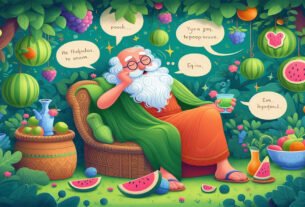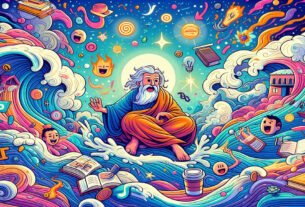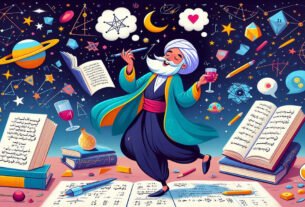Today, we’re embarking on such a deep philosophical journey that the tick-tocks of clocks won’t suffice. Because our guest is the philosopher who transformed time from a mechanical tool into a poetic experience: Henri-Louis Bergson! Born in Paris in 1859, this genius essentially turned philosophy into a work of art. Come on, let’s step into Bergson’s magical world!
“Traces of a Genius: Bergson’s Life and Intellectual Journey” 🎓📚🚶♂️
Bergson’s life is like a living manifestation of his philosophy. He studied mathematics and philosophy at the École Normale Supérieure, but he turned to philosophy, declaring, “Quality, not quantity, is what matters!” In 1889, he practically set off a bomb in the philosophical world with his work “Essai sur les données immédiates de la conscience” (Time and Free Will: An Essay on the Immediate Data of Consciousness).
In 1927, he won the Nobel Prize in Literature for “L’Évolution créatrice” (Creative Evolution) – an achievement rarely attained by a philosophical work! 🏆✨ His refusal to register with the Nazis during World War II shows he was not just a thinker, but also an intellectual principled to his core.
“A Revolutionary Concept: The Philosophy of Duration” 🌀🧠⏳
Bergson’s most important contribution was his division of time into two types:
- Mechanical Time ⏰🔢: Time measured by clocks, quantitative, homogeneous. This is necessary for science but insufficient for understanding life.
- Duration (La Durée) 🌊🎻: This is where Bergson’s real revolution lies! Duration is our “internal time,” the continuous flow of our lived experiences, memories, and emotions. Bergson’s following saying perfectly summarizes this concept: “Pure duration is a qualitative multiplicity; it is not a quantitative multiplicity.”
A Practical Example: A symphony you listen to at a concert 🎵 – mechanical time says “45 minutes,” but Bergsonian duration says, “Those 45 minutes are a qualitative whole filled with the passion, sorrow, excitement, and memories you experienced!” Every listener experiences the same 45 minutes as a different “duration.”
In his work “Matière et mémoire” (Matter and Memory), Bergson says: “The past is not something that is gnawed away by the present; it preserves itself in its entirety and grows alongside the present.” 📖🔍
“Time Travel, Bergson Style: The Power of Intuition and Memory” 🚀🔮🧩
According to Bergson, real time travel is not physical, but mental and intuitive:
- Memory: A Window to the Past 🗄️👁️
Bergson divides memory into “pure memory” and “habit memory.” Pure memory is the treasure chest where our entire past is stored. A memory, a scent, a melody can instantly transport us to the past. As Bergson said: “The past preserves itself in its entirety.” 🎞️🌹 - Intuition: The Art of Embracing the Future 💫🔭
For Bergson, intuition is the “sympathy of the mind” – meaning, the ability to grasp something from within. In his work “Introduction à la métaphysique” (An Introduction to Metaphysics), he writes: “Intuition is the ability of the mind to identify itself with things.” This is the philosophical path to “feeling” the future.
A Humorous Example: Nowadays, a Bergson fan, when late for a date, might say: “My dear teacher Bergson taught me that the anxiety and rush I experienced created a brand new ‘duration’! So I wasn’t late; I produced qualified time!” 😄🏃♂️💨
“Golden Leaves from Bergson’s Works” 📜💎✒️
- From “Creative Evolution”: “To live means to overcome obstacles. The greatest obstacle is matter itself.” 🐛🦋
- From his work “Laughter” (Le Rire): “The source of laughter is seeing something mechanical encrusted upon the living.” 😄🤖
- From “The Two Sources of Morality and Religion”: “Closed morality demands obedience, while open morality demands love.” ❤️🌍
“Bergson’s Poetic Side: The Meeting of Philosophy and Poetry” 📝🎭✨
Although a systematic philosopher, Bergson possessed a lyrical style. Even if he didn’t write poetry directly, his philosophical texts are adorned with an almost poetic language. He writes: “Time is a creative force, and every moment brings into existence something that did not exist before.” This is a poetic expression reflecting the essence of his philosophy.
“What Would Bergson Tell Us Today?” 🗣️🌐💡
- Critique of the Technological Age: 📱⏰ “The ‘instant’ shares on social media cannot replace real ‘duration’! Digital time is a qualitative-less, mechanical time.”
- Advice for Work Life: 💼🔄 “Don’t get stuck on quantitative data! Invest in qualitative ‘durations’ that nourish your creativity.”
- For Personal Development: 🌱🧘♀️ “Gift yourself ‘qualified time’ every day. When looking at a flower, chatting with your loved ones, live the ‘duration’ of that moment fully.”
- Critique of the Education System: 🎓📊 “Mechanical tests and standardized exams kill the student’s creative ‘duration’!”
“In Place of a Final Word: A Love Letter from Bergson” 💌🌅❤️
Never forget these words of Bergson: “Life is that which cuts through matter. It is a song that constantly invents itself.” 🎶🎻
Bergson whispers this to us: “You are not passive victims of mechanical time, but active creators of qualitative duration. Discover your internal time, fill it with meaningful experiences. Because a real life is measured not by the hours on a clock, but by the ‘durations’ lived.”
Pause for a moment and ask yourself: Am I a slave to mechanical time, or a poet of qualitative duration? How deeply do I feel my moments? And by becoming aware of my own internal time, how can I make my life more meaningful?
Bergson’s voice reaches us from across the century, precisely so that we may ask these questions.
Until our next philosophical journey… Remember: Real time travel is becoming aware of your own internal duration! 😊💫🌀




